Among the many many tragedies within the Gaza Strip through the eight weeks since Israel started the bombardment, and overshadowed by the deaths of greater than 15,000 individuals, is the destruction of the primary public library in Gaza Metropolis on 27 November. Some have accused Israel of intentionally attacking the library. However whether or not it did or not, the destruction of libraries in instances of conflict and violent battle is tragically frequent. It’s extra vital than ever for librarians and the general public to face up towards such assaults on information and cultural heritage.
When libraries are attacked, greater than the horrific destruction of books is concerned. Libraries are cultural repositories. They’ve collective reminiscence, protect cultural heritage, showcase group growth and supply people with alternatives for studying and development.
Libraries have been intentionally focused throughout conflicts for many years. In Sarajevo in 1992, Bosnian Serb forces intentionally attacked and destroyed the Nationwide and College Library of Bosnia and Herzegovina. Baghdad Nationwide Library was looted in 2003 as US forces stood by. Nazis systematically focused libraries and heritage websites all through Europe. Many of those libraries are nonetheless attempting to exchange or discover the misplaced materials.
However we will additionally be taught from the efforts to save lots of libraries, archives and cultural heritage in wartime. Typically conflict is predicted. Librarians, archivists and heritage employees can proactively develop catastrophe administration plans utilizing ways developed by their predecessors.
The British Library and St. Paul’s Cathedral, for instance, did measures to guard their most valuable supplies on the eve of World Conflict II. Right here, strategic collaborations proved essential. Librarians on the British Library rigorously documented every ebook to hint gadgets that is perhaps broken through the coming conflict. Then the British Archives, Museum and Library collections have been evacuated from London. Whereas many gadgets left behind have been broken and burned from bombing, duplicate copies of broken supplies have been accessible elsewhere because of institutional cooperation. In the meantime, the Nationwide Library of Wales and different storage amenities stored irreplaceable sources secure through the conflict.
Such efforts have been worldwide in scope. In 1939, Archibald MacLeish, Librarian of Congress of america, labored with others to teach librarians and the general public that an imminent risk from fascism emerged over numerous books and manuscripts, and he lobbied the Overseas Workplace, stressing the pressing want to guard Europe’s cultural treasures.
These are only a few examples. Different establishments created within the face of assaults on libraries and cultural heritage proceed at the moment. The United Nations Instructional, Scientific and Cultural Group was established in 1945 in response to the destruction of cultural heritage throughout World Conflict II. Initially centered on museums and archaeological websites, UNESCO’s mandate expanded over time and, regardless of restricted funds hindering direct motion, the group collaborates with affiliated worldwide teams and promotes joint efforts to guard cultural heritage, particularly in battle areas.
Equally, the Worldwide Committee of the Blue Protect, established in 1996, acts as a guardian of cultural heritage, a part of its objective being to assist shield libraries from assault throughout conflicts.
No initiative or group is ideal, and there’s ample criticism of UNESCO and the committee. And whereas none of those occasions provide a completed resolution to the destruction of Gaza Metropolis’s public library, we should look deeply at previous efforts and success tales to think about how we will cease additional destruction of libraries in Gaza and elsewhere.
Immediately, the implications of destroying libraries and cultural heritage go additional than ever earlier than. The destruction of libraries not solely creates a disturbing lack of invaluable information, it creates a void within the knowledge that informs fashions for synthetic intelligence. As librarians, we should work to make sure that AI algorithms are skilled on knowledge collected from all over the world, not devoid of human information from any a part of civilization – particularly the Center East, which has suffered horrific assaults on libraries over the previous 50 12 months.
There are a number of methods for preserving human information, particularly in instances of conflict. Libraries and archives should take proactive measures to guard collections earlier than a battle arises. This consists of creating catalog information for every merchandise, shifting an important and irreplaceable collections to secure areas when attainable, and establishing duplicate copies in print or by means of digitization, which stands out as an important preservation methodology.
We are able to emphasize prevention over restoration—each in working with our governments to forestall conflict and in our skilled capability to guard information. Though challenges on the bottom, technological limitations and lack of sources can generally make this inconceivable, we should all the time maintain attempting.
The preservation of human life should be prioritized. And but it mustn’t and can’t be at odds with stopping assaults on libraries – or digitizing the information they include.
As librarians and as residents, we should unite to safe human information and guarantee a future the place essential chapters in human historical past and reminiscence should not erased.
Laila Hussein Moustafa is an affiliate professor and librarian on the College of Illinois Urbana-Champaign Faculty of Info Sciences.

